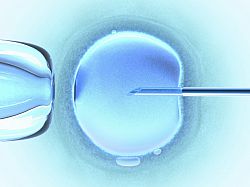Controversial 'three-parent baby' technology carries health risks for males
A newly proposed IVF technique that would remove the chance of passing on an array of genetic diseases between mother and child poses other hidden health dangers, according to a new study involving scientists at the University of Sussex.
 Published today (20 September) in Science, the paper emphasises that male babies may be more at risk from the controversial treatment that’s due to be debated by Parliament next year.
Published today (20 September) in Science, the paper emphasises that male babies may be more at risk from the controversial treatment that’s due to be debated by Parliament next year.
Mitochondrial replacement therapy (MR) involves replacing the mother's damaged mitochondria – the part of the human cell generally regarded as its power supply but which may also contain mutated genes – with that from a healthy donor.
Each year one in 200 children in the UK are born with a mitochondrial mutation and one in 4,000 develop a mitochondrial disease, which range from mild learning difficulties to debilitating conditions such as muscular dystrophy and other life-threatening heart, muscle and brain diseases.
MR would effectively create a baby with DNA from three parents but remove the mother's mutated DNA to prevent the female from passing on these mutations.
The technique is regarded as controversial because it involves modification of the embryo's DNA. This means that the third party's genetic material will not only be passed on to the child but also to future generations down the female line.
However, scientists at the University of Sussex, the University of Sheffield and Monash University in Australia compiled evidence that indicates MR can have profound changes in the gene expression of individuals beyond removing the risk of mitochondrial diseases.
A donor's mitochondria may affect a range of important traits such as individual development, cognitive behaviour and key health parameters in the recipient.
University of Sussex evolutionary biologist Dr Morrow says: “The mitochondria contains a tiny amount of genes – fewer than 40 compared with something like 20,000 in the nucleus of the cell. But what has not been fully explored yet is how these genes interact. A mutation in the mitochondria genome may be compensated for in the nuclear genome.
“The problem with taking putative healthy mitochondria from a donor is that this new combination of DNA may end up being the wrong combination, with other problems emerging.”
The researchers say complications occur more often in males because mitochondria are passed down only from mothers, never from fathers. Any negative effects of mitochondria on a male's DNA can, therefore, never be removed by evolution.
If detailed proposals regulating the MR procedure pass a public consultation and are approved by Parliament next year, the world's first three-parent baby could be born in Britain by 2015.
Lead author of the study, Dr Klaus Reinhardt of the University of Sheffield, says: "This technology has the potential to allow affected mothers to have healthy babies. Continuing some of the promising research avenues may be an important step towards the safety of this technology."
